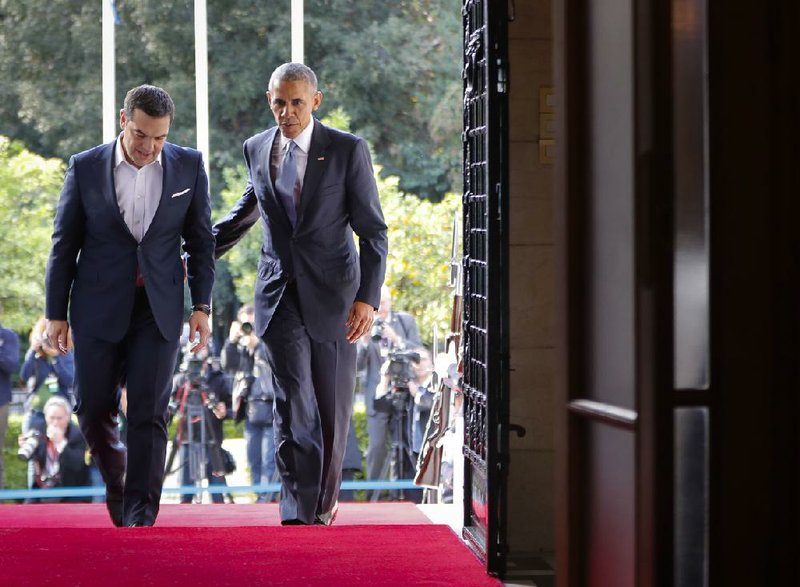ATHENS, Greece -- President Barack Obama, in some of his strongest language since Donald Trump's election last week, on Tuesday warned against the rise of nationalistic tribalism, apparently a reference to Trump's decision to appoint Breitbart.com's Stephen Bannon to a top position.
RELATED ARTICLES
http://www.arkansas…">Hiccups slow Trump's team http://www.arkansas…">State bids swell to go see oathhttp://www.arkansas…">House GOP firmly backs Ryan as speaker
"I do believe, separate and apart from any particular election or movement, that we are going to have to guard against a rise in a crude sort of nationalism or ethnic identity or tribalism that is built around an 'us' and a 'them,'" Obama said.
Obama's remarks came in an hourlong news conference in Athens on his final trip overseas as president. He went to Greece partly to bolster Greek hopes of further debt relief from its European partners, which will meet Dec. 5 to consider giving the ailing nation another pass on its mountain of debt.
But Trump's election last week subverted Obama's top foreign-policy priorities.
On Monday, just hours before he flew across the Atlantic, Obama offered conciliatory remarks on Trump and his coming administration during a White House news conference. He declined Monday to comment on Trump's selection of Bannon -- a media executive whose website, Breitbart.com, has been criticized as promoting white nationalist, racially discriminatory and anti-Semitic views -- as chief White House strategist and senior counselor.
By Tuesday, however, Obama seemed to reverse himself, making pointed remarks about the dangers of overturning his administration's track record on race relations or returning to decades-old forms of bigotry.
"In the United States, we know what happens when we start dividing ourselves along lines of race or religion or ethnicity. It's dangerous," he said. "Not just for the minority groups that are subjected to that kind of discrimination or, in some cases in the past violence, but because we don't then realize our potential as a country when we're preventing blacks or Latinos or Asians or gays or women from fully participating in the project of building American life."
Obama was unapologetic and unequivocal on his record of inclusiveness.
"So my vision's right on that issue," he said. "And it may not always win the day in the short term in any particular political circumstance, but I'm confident it will win the day over the long term."
Obama said the desire for change was a major factor in Trump's victory.
"Sometimes people just feel as if we want to try something to see if we can shake things up, and that I suspect was a significant phenomenon," he said.
He said that while Trump's victory and Britain's vote in June to leave the European Union differed in important respects, the two electoral shake-ups both grew out of dislocations that have resulted from a rapidly changing and globalizing world.
"Globalization combined with technology combined with social media and constant information have disrupted people's lives, sometimes in very concrete ways," Obama said while standing next to Greek Prime Minister Alexis Tsipras. "A manufacturing plant closes, and suddenly an entire town no longer has what was the primary source of employment."
He said the effects can be psychological as well, making people "less certain of their national identities or their place in the world."
"When you see a Donald Trump and a Bernie Sanders, very unconventional candidates, having considerable success, then obviously there is something there that is being tapped into," Obama said. "A suspicion of globalization. A desire to rein in its excesses."
The increasing pain felt by working people had led to a growing suspicion of elites and governing institutions, he said.
"And that sometimes gets wrapped up in issues of ethnic identity or religious identity or cultural identity, and that can be a volatile mix," Obama said.
Obama complimented Tsipras on the political and structural overhauls he had pushed through -- changes that severely damaged Tsipras' popularity in Greece. And he said he planned to urge others in Europe to forgive more of Greece's debt.
Obama is to fly today to Berlin, where he will spend at least two days in meetings with Chancellor Angela Merkel of Germany, and then in a meeting with the leaders of France, Britain and Spain.
For his part, Tsipras again denounced Europe's decision in the aftermath of the 2008 financial crisis to embark on a program of "disastrous austerity, which made the problems more acute instead of resolving them." He noted that Greece's economy at its worst had contracted by 25 percent and that its unemployment rate had peaked at 27 percent.
A Section on 11/16/2016
